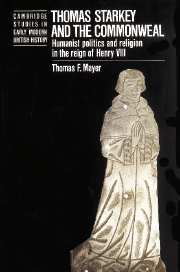Book contents
- Frontmatter
- Contents
- Acknowledgements
- A note on citations and abbreviations
- Introduction
- 1 Early life and education
- 2 Humanism from the source
- 3 ‘Occasyon and tyme wyl never be restorey agayne’: Pole, Paris and the Dialogue
- 4 A responsible aristocracy
- 5 The Dialogue in classical and ‘medieval’ tradition
- 6 An English spirituale
- 7 ‘Homo politicus et regalis’
- 8 Writing for the drawer
- Conclusion
- Bibliography
- Index
4 - A responsible aristocracy
Published online by Cambridge University Press: 03 November 2009
- Frontmatter
- Contents
- Acknowledgements
- A note on citations and abbreviations
- Introduction
- 1 Early life and education
- 2 Humanism from the source
- 3 ‘Occasyon and tyme wyl never be restorey agayne’: Pole, Paris and the Dialogue
- 4 A responsible aristocracy
- 5 The Dialogue in classical and ‘medieval’ tradition
- 6 An English spirituale
- 7 ‘Homo politicus et regalis’
- 8 Writing for the drawer
- Conclusion
- Bibliography
- Index
Summary
The content and presentation of Starkey's Dialogue reveal that he had profited from Bembo's and Sadoleto's examples and acquired skills vital to any courtier, especially the ability to write and speak ambiguously. Since Starkey's major work lacks a title, we must assume with its nineteenth-century editor that Starkey meant it to be a dialogue. This, of course, means little given the vast sprawl of that form in the early sixteenth century, so that it is not surprising that commentators disagree over how well Starkey followed the example of his fifteenth-century predecessors. Joel Altman praises Starkey's ‘remarkable work’ because it ‘suggests how constructively the spirit of debate, exercising its ethical neutrality, may be applied to public business’. Altman would probably accept for Starkey Dennis Gilkey's characterization of the dialogues of More or Erasmus, which showed the reader ‘in an open-minded, open-ended way [how] to enter into and continue a dialogue of ideas, cultures, and customs’. Alistair Fox says much the same thing. It would then appear that the same sort of ‘polyphonic’ structure which Artur Blaim detects in Utopia also characterized the Dialogue. In both, independent points of view clashed constantly, and thereby shaped the form of the work. John King does not agree, contending that Starkey's work clearly led ‘Pole’ along, even if it was not as one-sided as More's polemical dialogues.
- Type
- Chapter
- Information
- Thomas Starkey and the CommonwealthHumanist Politics and Religion in the Reign of Henry VIII, pp. 106 - 138Publisher: Cambridge University PressPrint publication year: 1989



